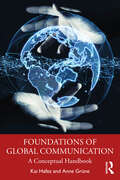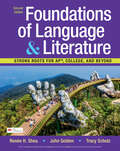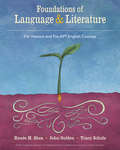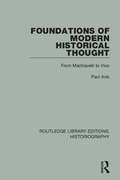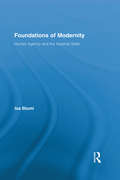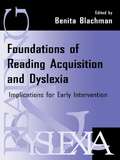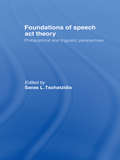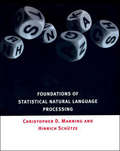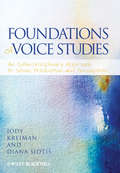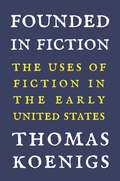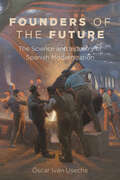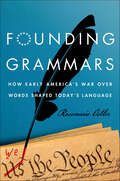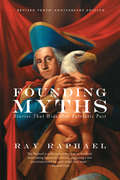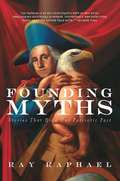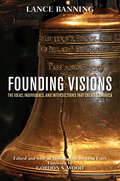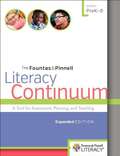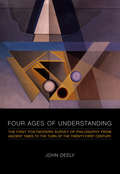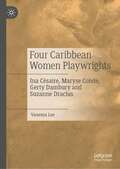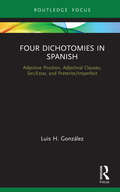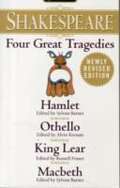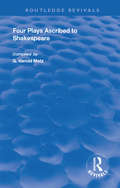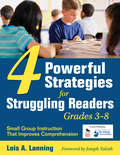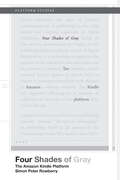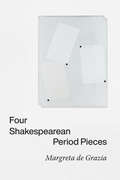- Table View
- List View
Foundations of Global Communication: A Conceptual Handbook
by Kai Hafez Anne GrüneThis book provides a wide-ranging theoretical and empirical overview of the disparate achievements and shortcomings of global communication. This exceptionally ambitious and systematic project takes a critical perspective on the globalization of communication. Uniquely, it sets media globalization alongside a plethora of other globalized forms of communication, ranging from the individual to groups, civil society groupings, commercial enterprises and political formations. The result is a sophisticated and impressive overview of globalized communication across various facets, assessing the phenomena for the extent to which they live up to the much-hyped claims of globalization’s potential to create a globally interdependent society. The setbacks of globalization, such as right-wing populism and religious fundamentalism, can only be understood if the shortcomings of global communication are taken more seriously. Covering all types of cross-border global communication in media, political and economic systems, civil societies, social media and lifeworlds of the individual, this unique book is invaluable for students and researchers in media, communication, globalization and related areas.
Foundations of Language & Literature
by Renee H. Shea John Golden Tracy ScholzFoundations of Language and Literature provides all 9th grade ELA learners with the skills and practice needed to achieve success in high school and beyond.
Foundations of Language and Literature: For Honors and Pre-AP English Courses
by Renée H. Shea John Golden Tracy Scholz<P>The key word in the title of this textbook is foundations. <P>Our purpose in writing the book is to provide opportunities for students to practice the most essential skills they will need in order to be successful in their freshman year, and to lay the groundwork for their path to AP® English. <P>In this book, students will find a wide range of texts — short stories, poems, essays, plays, myths, and images — and activities designed to build skills and then push them further. <P>We hope that it helps teachers create supportive yet challenging courses and helps students feel confident in making their voices heard.
Foundations of Modern Historical Thought: From Machiavelli to Vico (Routledge Library Editions: Historiography)
by Paul AvisThe emergence of a sense of the past in Renaissance humanism gave rise to a new historical consciousness about the meaning of history and methods of historical enquiry. This book, originally published in 1986, provides an in-depth critical introduction to the historical thought of some of the most influential thinkers of Western culture, from Machiavelli’s reflections on history and power to the revolutionary intuitions of Giambattista Vico’s New Science of historical understanding, taking in Bodin, Montaigne, Bacon, Descartes, Hobbes, Locke, Newton, Leibniz and Bayle on the way.
Foundations of Modernity: Human Agency and the Imperial State (Routledge Studies in Modern History)
by Isa BlumiInvestigating how a number of modern empires transform over the long 19th century (1789-1914) as a consequence of their struggle for ascendancy in the Eastern Mediterranean and Middle East, Foundations of Modernity: Human Agency and the Imperial State moves the study of the modern empire towards a comparative, trans-regional analysis of events along the Ottoman frontiers: Western Balkans, the Persian Gulf and Yemen. This inter-disciplinary approach of studying events at different ends of the Ottoman Empire challenges previous emphasis on Europe as the only source of change and highlights the progression of modern imperial states. The book introduces an entirely new analytical approach to the study of modern state power and the social consequences to the interaction between long-ignored "historical agents" like pirates, smugglers, refugees, and the rural poor. In this respect, the roots of the most fundamental institutions and bureaucratic practices associated with the modern state prove to be the by-products of certain kinds of productive exchange long categorized in negative terms in post-colonial and mainstream scholarship. Such a challenge to conventional methods of historical and social scientific analysis is reinforced by the novel use of the work of Louis Althusser, Talal Asad, William Connolly and Frederick Cooper, whose challenges to scholarly conventions will prove helpful in changing how we understand the origins of our modern world and thus talk about Modernity. This book offers a methodological and historiographic intervention meant to challenge conventional studies of the modern era.
Foundations of Reading Acquisition and Dyslexia: Implications for Early Intervention
by Benita A. BlachmanThe chapters in this volume are based on presentations made at a recent conference on cognitive and linguistic foundations of reading acquisition. The researchers who participated have all made contributions to the theoretical and empirical understanding of how children learn to read. They were asked to address not only what they have learned from their research, but also to discuss unsolved problems. This dialogue prompted numerous questions of both a theoretical and applied nature, generated heated debate, and fueled optimism about the important gains that have been made in the scientific understanding of the reading process, especially of the critical role played by phonological abilities.
Foundations of Speech Act Theory: Philosophical and Linguistic Perspectives
by Savas L. TsohatzidisFoundations of Speech Act Theory investigates the importance of speech act theory to the problem of meaning in linguistics and philosophy. The papers in this volume, written by respected philosophers and linguists, significantly advance standards of debate in this area. Beginning with a detailed introduction to the individual contributors, this collection demonstrates the relevance of speech acts to semantic theory. It includes essays unified by the assumption that current pragmatic theories are not well equipped to analyse speech acts satisfactorily, and concludes with five studies which assess the relevance of speech act theory to the understanding of philosophical problems outside the area of philosophy of language.
Foundations of Statistical Natural Language Processing
by Hinrich Schutze Christopher ManningStatistical approaches to processing natural language text have become dominant in recent years. This foundational text is the first comprehensive introduction to statistical natural language processing (NLP) to appear. The book contains all the theory and algorithms needed for building NLP tools. It provides broad but rigorous coverage of mathematical and linguistic foundations, as well as detailed discussion of statistical methods, allowing students and researchers to construct their own implementations. The book covers collocation finding, word sense disambiguation, probabilistic parsing, information retrieval, and other applications.
Foundations of Voice Studies: An Interdisciplinary Approach to Voice Production and Perception
by Diana Sidtis Jody KreimanFoundations of Voice Studies provides a comprehensive description and analysis of the multifaceted role that voice quality plays in human existence. Offers a unique interdisciplinary perspective on all facets of voice perception, illustrating why listeners hear what they do and how they reach conclusions based on voice quality Integrates voice literature from a multitude of sources and disciplines Supplemented with practical and approachable examples, including a companion website with sound files at www.wiley.com/go/voicestudies Explores the choice of various voices in advertising and broadcasting, and voice perception in singing voices and forensic applications Provides a straightforward and thorough overview of vocal physiology and control
Founded in Fiction: The Uses of Fiction in the Early United States
by Thomas KoenigsAn original account of the importance of diverse forms of fiction in the early American republic—one that challenges the &“rise of the novel&” narrativeWhat is the use of fiction? This question preoccupied writers in the early United States, where many cultural authorities insisted that fiction-reading would mislead readers about reality. Founded in Fiction argues that this suspicion made early American writers especially attuned to one of fiction&’s defining but often overlooked features—its fictionality. Thomas Koenigs shows how these writers explored the unique types of speculative knowledge that fiction could create as they sought to harness different varieties of fiction for a range of social and political projects.Spanning the years 1789–1861, Founded in Fiction challenges the &“rise of novel&” narrative that has long dominated the study of American fiction by highlighting how many of the texts that have often been considered the earliest American novels actually defined themselves in contrast to the novel. Their writers developed self-consciously extranovelistic varieties of fiction, as they attempted to reform political discourse, shape women&’s behavior, reconstruct a national past, and advance social criticism. Ambitious in scope, Founded in Fiction features original discussions of a wide range of canonical and lesser-known writers, including Hugh Henry Brackenridge, Royall Tyler, Charles Brockden Brown, Leonora Sansay, Catharine Maria Sedgwick, Edgar Allan Poe, Robert Montgomery Bird, George Lippard, Harriet Beecher Stowe, Frederick Douglass, and Harriet Jacobs.By reframing the history of the novel in the United States as a history of competing varieties of fiction, Founded in Fiction shows how these fictions structured American thinking about issues ranging from national politics to gendered authority to the intimate violence of slavery.
Founders of the Future: The Science and Industry of Spanish Modernization (Campos Ibéricos: Bucknell Studies in Iberian Literatures and Cultures)
by Óscar Iván UsecheIn this ambitious new interdisciplinary study, Useche proposes the metaphor of the social foundry to parse how industrialization informed and shaped cultural and national discourses in late nineteenth- and early twentieth-century Spain. Across a variety of texts, Spanish writers, scientists, educators, and politicians appropriated the new economies of industrial production—particularly its emphasis on the human capacity to transform reality through energy and work—to produce new conceptual frameworks that changed their vision of the future. These influences soon appeared in plans to enhance the nation’s productivity, justify systems of class stratification and labor exploitation, or suggest state organizational improvements. This fresh look at canonical writers such as Emilia Pardo Bazán, Concha Espina, Benito Pérez Galdós, Vicente Blasco Ibáñez, and José Echegaray as well as lesser known authors offers close readings of their work as it reflected the complexity of Spain’s process of modernization.
Founding Grammars: How Early America's War Over Words Shaped Today's Language
by Rosemarie OstlerA “lively and revealing” history of America’s obsession with grammar—from the debate over double negatives to the influence of frontier vernacular (Kirkus Reviews).Standard grammar and accurate spelling are widely considered hallmarks of a good education, but their exact definitions are much more contentious—capable of inciting a full-blown grammar war at the splice of a comma. With an accessible and enthusiastic approach, Ostler considers these grammatical shibboleths, tracing current debates back to America’s earliest days, an era when most families owned only two books—the Bible and a grammar primer.Along the way, she investigates colorful historical characters on both sides of the grammar debate in her efforts to unmask the origins of contemporary speech. Linguistic founding fathers like Noah Webster, Tory expatriate Lindley Murray, and post-Civil War literary critic Richard Grant White, all play a featured role in creating the rules we’ve come to use, and occasionally discard, throughout the years. Founding Grammars is for curious readers who want to know where grammar rules have come from, where they’ve been, and where they might go next.
Founding Myths
by Ray RaphaelFirst published ten years ago, award-winning historian Ray Raphael's Founding Myths has since established itself as a landmark of historical myth-busting. With the author's trademark wit and flair, Founding Myths exposes the errors and inventions in America's most cherished tales, from Paul Revere's famous ride to Patrick Henry's "Liberty or Death" speech. For the seventy thousand readers who have been captivated by Raphael's eye-opening accounts, history has never been the same.In this revised tenth-anniversary edition, Raphael revisits the original myths and explores their further evolution over the past decade, uncovering new stories and peeling back additional layers of misinformation. This new edition also examines the highly politicized debates over America's past, as well as how school textbooks and popular histories often reinforce rather than correct historical mistakes.A book that "explores the truth behind the stories of the making of our nation" (National Public Radio), this revised edition of Founding Myths will be a welcome resource for anyone seeking to separate historical fact from fiction.
Founding Myths: Stories That Hide Our Patriotic Past
by Ray RaphaelWith wit and flair, Founding Myths exposes the errors and inventions in thirteen of America's most cherished tales, from Paul Revere's famous ride to Patrick Henry's "Liberty or Death" speech. Exploring the dynamic intersection between history-making and story-making, award-winning author and historian Ray Raphael shows how these fictions--conceived in the narrowly nationalistic politics of the nineteenth century--undermine our democratic ideals.
Founding Visions: The Ideas, Individuals, and Intersections that Created America
by Lance Banning“Banning’s skill as an essayist shines” in this collection of writing on the foundation of the American republic (San Francisco Book Review).Lance Banning was assembling this collection of his best and most representative writings on the Founding era when his untimely death stalled the project just short of its completion. Now, thanks to the efforts of editor Todd Estes, this illuminating resource is finally available. Founding Visions showcases the work of a historian who shaped the intellectual debates of his time. Featuring a foreword by Gordon S. Wood, the volume presents Banning’s most seminal and insightful essays to a new generation of students, scholars, and general readers.“Lance Banning’s balanced but penetrating view of historical materials makes him a vital mediator in scholarly disputes, one who knows how to bring light rather than heat to controversies better understood as joint contributions. . . . Every historian, whether beginning or advanced, will benefit from reading this book.” —Robert A. Ferguson, Columbia University, author of Reading the Early Republic“Banning’s impeccable scholarship has shaped the way we think about early American history, and the essays in this volume show him at the peak of his very considerable powers.” —Peter S. Onuf, Robert H. Smith International Center for Jefferson Studies, author of The Origins of the Federal Republic: Jurisdictional Controversies in the United States, 1775-1787“Exemplary.” —Journal of Southern History“The work represents an impressive collection that is an essential companion to any serious student of the intellectual issues of the early Republic.” —Southern Historian
Fountas and Pinnell Literacy Continuum
by Irene Fountas Gay PinnellThere has never been a more comprehensive resource available to teachers that does what the continuum does - provide specific behaviors and understandings that are required at each level for students to demonstrate thinking within, beyond, and about the text. These behaviors and understandings describe what students will be expected to do in order to effectively read and understand the text. <p><p> More in-depth, more intuitive, and more essential than ever-The Fountas & Pinnell Literacy Continuum, Expanded Edition enables teachers to construct a common vision for student achievement that effectively and efficiently engages all students in the robust, authentic and meaningful literacy learning every child deserves. The Literacy Continuum provides a way to look for specific evidence of learning from prekindergarten through grade eight, and across eight instructional contexts. Each instructional context contributes substantially, in different but complementary ways, to students' development of the literacy process. With this indispensable literacy tool, Fountas and Pinnell remind you of The Literacy Continuum's critical role in transforming literacy teaching and learning.
Four Ages of Understanding: The First Postmodern Survey of Philosophy from Ancient Times to the Turn of the Twenty-First Century (Toronto Studies in Semiotics and Communication)
by John DeelyThis book redraws the intellectual map and sets the agenda in philosophy for the next fifty or so years. By making the theory of signs the dominant theme in Four Ages of Understanding, John Deely has produced a history of philosophy that is innovative, original, and complete. The first full-scale demonstration of the centrality of the theory of signs to the history of philosophy, Four Ages of Understanding provides a new vantage point from which to review and reinterpret the development of intellectual culture at the threshold of "globalization". Deely examines the whole movement of past developments in the history of philosophy in relation to the emergence of contemporary semiotics as the defining moment of Postmodernism. Beginning traditionally with the Pre-Socratic thinkers of early Greece, Deely gives an account of the development of the notion of signs and of the general philosophical problems and themes which give that notion a context through four ages: Ancient philosophy, covering initial Greek thought; the Latin age, philosophy in European civilization from Augustine in the 4th century to Poinsot in the 17th; the Modern period, beginning with Descartes and Locke; and the Postmodern period, beginning with Charles Sanders Peirce and continuing to the present. Reading the complete history of philosophy in light of the theory of the sign allows Deely to address the work of thinkers never before included in a general history, and in particular to overcome the gap between Ockham and Descartes which has characterized the standard treatments heretofore. One of the essential features of the book is the way in which it shows how the theme of signs opens a perspective for seeing the Latin Age from its beginning with Augustine to the work of Poinsot as an indigenous development and organic unity under which all the standard themes of ontology and epistemology find a new resolution and place. A magisterial general history of philosophy, Deely's book provides both a strong background to semiotics and a theoretical unity between philosophy's history and its immediate future. With Four Ages of Understanding Deely sets a new agenda for philosophy as a discipline entering the 21st century.
Four Caribbean Women Playwrights: Ina Césaire, Maryse Condé, Gerty Dambury and Suzanne Dracius
by Vanessa LeeFour Caribbean Women Playwrights aims to expand Caribbean and postcolonial studies beyond fiction and poetry by bringing to the fore innovative women playwrights from the French Caribbean: Ina Césaire, Maryse Condé, Gerty Dambury, Suzanne Dracius. Focussing on the significance of these women writers to the French and French Caribbean cultural scenes, the author illustrates how their work participates in global trends within postcolonial theatre. The playwrights discussed here all address socio-political issues, gender stereotypes, and the traumatic slave and colonial pasts of the Caribbean people. Investigating a range of plays from the 1980s to the early 2010s, including some works that have not yet featured in academic studies of Caribbean theatre, and applying theories of postcolonial theatre and local Caribbean theatre criticism, Four Caribbean Women Playwrights should appeal to scholars and students in the Humanities, and to all those interested in the postcolonial, the Caribbean, and contemporary theatre.
Four Dichotomies in Spanish: Adjective Position, Adjectival Clauses, Ser/Estar, and Preterite/Imperfect
by Luis H. GonzálezExamining four dichotomies in Spanish, this book shows how to reduce the six to ten rules common in textbooks for each contrast to a single binary distinction. That distinction is a form of totality vs. part, easier to see in some of the dichotomies, but present in all of them. Every chapter is example-driven, and many of those examples come from writing by students. Readers can test out for themselves the explanation at work in the examples provided. Then, those examples are explained step by step. In addition to examples from writing by college students, there are examples from RAE (Real Academia Española), from scholars, from writers, from Corpes XXI (RAE), from the Centro Virtual Cervantes, and from the Internet. Many of those examples are presented to the reader as exercises, and answers are provided. This book was written for teachers of Spanish as a second language (L2) and for minors or majors of Spanish as an L2. It will also benefit teachers and learners of other L2s with some of these dichotomies.
Four Dubliners: Wilde, Yeats, Joyce, and Beckett
by Richard EllmannBiographies, histories, and literary criticisms of the 4 Irish authors.
Four Great Tragedies: Hamlet, Macbeth, King Lear,Othello
by William Shakespeare Sylvan BarnetThe greatest works of tragedy from the Bard, this book features Hamlet, Othello, King Lear and Macbeth.
Four Plays Ascribed to Shakespeare: An Annotated Bibliography (Routledge Revivals)
by G. Harold MetzFirst published in 1982, this volume responds to the attribution of numerous plays to Shakespeare which were not his own and selects four plays which have been ascribed in whole or in part to Shakespeare by responsible, talented scholars: The Reign of King Edward III, Sir Thomas More, The History of Cardenio and The Two Noble Kinsmen. Included in the bibliography are all the books, chapters and appendices of books, articles, review articles, reviews and notices of stage productions and a limited number of the more substantial discussions dealing with the four plays and published since 1930. The bibliography is organized by play with an initial section listing items dealing with two or more plays.
Four Powerful Strategies for Struggling Readers, Grades 3-8: Small Group Instruction That Improves Comprehension
by Lois A. LanningHelp struggling readers succeed by teaching four research-based comprehension strategies with sample lessons and a gradual-release approach leading to student-directed learning.
Four Shades of Gray: The Amazon Kindle Platform (Platform Studies)
by Simon Peter RowberryThis first book-length analysis of Amazon&’s Kindle explores the platform&’s technological, bibliographical, and social impact on publishing.Four Shades of Gray offers the first book-length analysis of Amazon&’s Kindle and its impact on publishing. Simon Peter Rowberry recounts how Amazon built the infrastructure for a new generation of digital publications, then considers the consequences of having a single company control the direction of the publishing industry. Exploring the platform from the perspectives of technology, texts, and uses, he shows how the Kindle challenges traditional notions of platforms as discrete entities. He argues that Amazon&’s influence extends beyond &“disruptive technology&” to embed itself in all aspects of the publishing trade; yet despite industry pushback, he says, the Kindle has had a positive influence on publishing. Rowberry documents the first decade of the Kindle with case studies of Kindle Popular Highlights, an account of the digitization of books published after 1922, and a discussion of how Amazon&’s patent filings reflect a shift in priorities. Rowberry argues that while it was initially convenient for the book trade to outsource ebook development to Amazon, doing so has had adverse consequences for publishers in the mid- and long term, limiting opportunities for developing an inclusive and forward-thinking digital platform. While it has forced publishers to embrace digital forms, the Kindle has also empowered some previously marginalized readerships. Although it is still too early to judge the long-term impact of ebooks compared with that of the older technologies of clay tablets, the printing press, and offset printing, the shockwaves of the Kindle continue to shape publishing.
Four Shakespearean Period Pieces
by Margreta de GraziaIn the study of Shakespeare since the eighteenth century, four key concepts have served to situate Shakespeare in history: chronology, periodization, secularization, and anachronism. Yet recent theoretical work has called for their reappraisal. Anachronisms, previously condemned as errors in the order of time, are being hailed as alternatives to that order. Conversely chronology and periods, its mainstays, are now charged with having distorted the past they have been entrusted to represent, and secularization, once considered the driving force of the modern era, no longer holds sway over the past or the present. In light of this reappraisal, can Shakespeare studies continue unshaken? This is the question Four Shakespearean Period Pieces takes up, devoting a chapter to each term: on the rise of anachronism, the chronologizing of the canon, the staging of plays “in period,” and the use of Shakespeare in modernity’s secularizing project. To read these chapters is to come away newly alert to how these fraught concepts have served to regulate the canon’s afterlife. Margreta de Grazia does not entirely abandon them but deftly works around and against them to offer fresh insights on the reading, editing, and staging of the author at the heart of our literary canon.
